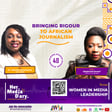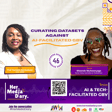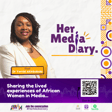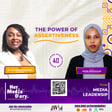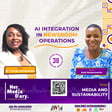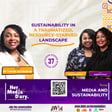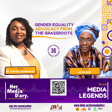Journalistic Integrity and Values
00:00:04
Speaker
I remember just as a very young ah reporter, one of my editors sent me to do an interview with a politician. I went and interviewed this gentleman in his office. And after the interview, he pulled out his drawer and removed a wag of notes. And I told him, no, I'm sorry, I can't take that.
00:00:24
Speaker
And he said, no, I'm not bribing you. I'm just buying your tea. I said, well, if when I came in, you had a cup of tea on the table for me, we would have had a cup of tea, but I'll definitely not take your money. And of course, after I went back to the newsroom, even before I got there, he had called my editor and say, this young girl refused to take my tea. So the editor told me, very good. That's how you establish yourself as a journalist.
Mission and Vision of African Women in Media
00:00:57
Speaker
Imagine a world where we have gender equality and equity in and through media. That is our mission at African Women in Media. I'm Dr. Yemesia Akimabola, and this is Her Media Diary, a podcast that captures the lived experiences of African women working in media industries. In this episode, I'm joined by Pamela McCotty-Citoney.
00:01:19
Speaker
A prominent Kenyan journalist and media executive with a career span over two decades. Now Pamela shares her inspiring journey from a humble beginning in Kenya to becoming a prominent figure in the industry. Now she discusses the impact of a large family on building their confidence and a passion for journalism which just sparked by early experiences.
Spotlight on Pamela McCotty-Citoney
00:01:44
Speaker
So as always throughout this series we'll be in conversation with African women who have made a name for themselves by holding vital leadership positions in their various newsrooms. We hope that by inviting these voices into conversation it will provide solutions to breaking barriers faced by African women in media in the
00:02:09
Speaker
Pamela Citroni, it's such a pleasure to have you on the podcast. I don't know how long we've been trying to organize this, but you've been very kind to and give us your time. And and I'm sure you've been listening to the podcast so you know that where we start, we're getting to know the person because we all know how successful you are, right? You've done amazing, amazing things and we've got a lot to learn from you for this series on media and leadership. So let's start from the beginning. Where did you grow up, Pamela?
Pamela's Upbringing and Family Influence
00:02:37
Speaker
Thanks, Yemi. I grew up in Western Kenya. I am the ninth child and last born in a family of yeah nine nine children. So I grew up in a large family with three sisters and five brothers, a very loving family. My mother was a primary school teacher and my father was a civil servant.
00:03:03
Speaker
So basically, a humble family, I would say, when I look back. But we grew up feeling very empowered. ah My parents never made us feel like we lacked anything because you you really had the basics. You went to school, you had food at home. So that's the kind of place that I grew up in and the kind of environment I grew up in. And I think it helped to really boost my confidence as a last child with many big brothers and sisters, I really had to speak up and to fight for my space within the family and to make sure my voice got heard too. Yeah. And that's the person that I was raised to be. Yeah. Tell me more about that. What was it like to be the ninth, like the last born of all these children? It's interesting because when I look back by the time I was born, my first born brother was already out of home because he had finished
00:04:03
Speaker
secondary school. But it was always a very happy environment, especially when schools ah closed and we were all home for the holidays. So we'd have sessions where we'd hear stories about high school. And I was just a little girl growing up. And I remember my brothers and sisters would be singing all these themes that they would sing in school. And I think I kind of grew up before my time because I was growing up with everybody who was much older.
Educational Expectations and Achievements
00:04:32
Speaker
Of course, I was expected to match up. So my parents were really keen that you should do well in school. And from a very early age, I knew that people went to school. And then, you know, when you look at your future, and you're talking about your future, you'd say, okay, I'll finish primary school, and then I'll go to secondary school, and then I'll go to university because I'd watched my brother's already go through that. So it was a given that you just went to school and completed and went to university and then after university got a job. It's much, much later that I realized that for many families that was not a norm at all, especially at that time.
00:05:14
Speaker
In fact, ah issues of dropping out of school or getting pregnant along the way, those are not things that we even thought about in my family because the norm was that you just went to school and you completed school. Yeah. Describe Western Kenya to me from your perspective, from the eyes of, you know, family in those years.
00:05:37
Speaker
So Western Kenya, let me tell you about the village that I grew up in. We lived very close to the school and a church, and it was a very communal village. So it happened also that because of the way clans settled, that was my ancestral home at the start. So everybody around me was really a relative.
00:05:59
Speaker
ah so they And we just didn't call them aunt, you called them mother. So you had so many mothers growing up and everybody's mother was your mother. Western Kenya is a beautiful place. It's really green most of the year round. So there's a lot of food, foods, and there were some very poor people, but it was easy to come by food. It was as school was just next door so we just crossed the road and went into school and then a few years later we moved to still in Western Kenya but to a bigger farm and I think it was a really happy place growing up looking after our two or three cows ah watching the them being milked
00:06:47
Speaker
watching food being grown, yeah harvested. It was a really happy childhood, I must say. Yeah.
Gender-Neutral Upbringing and Community Support
00:06:55
Speaker
You mentioned earlier on about how being the ninth child means that you were used to kind of you know struggling to make your voice heard. Tell me some of those fond memories that you have of of doing that. So the way we are structured in our family, my mother had five sons and then she had four daughters. So the girls were all younger and I just remember things like when my brothers would come home and the first question would be, can you bring your report card? What number were you? And you really had to defend yourself and say why you are that position or can you spell this word? And and you had to know how to spell that word otherwise. um they They actually had the liberty to turn us.
00:07:39
Speaker
as as our big brother. So you would get the can if you didn't do that. Wow. Okay. So it was your brothers asking you for your report cards. Yes. It was, of course, first it was my mother because she was a teacher. So she was very aware. My dad didn't live with us because he worked in the city at that time. But of course, my mother would already have disciplined you for not performing well. But when my brothers came home, they had some level of authority over us and they would, you know,
00:08:08
Speaker
Let's see how you performed in school. Let me hear you say this in English. Can you repeat this? ah How do you count? You know, just as you're growing up, but also just the fact that when we, for example, converged in the evening as dinner was being prepared. So we actually used add stones and had a fireplace.
00:08:33
Speaker
and the dinner would be being prepared, but would all sit in the kitchen. And this is something that I really appreciated because then i knew everybody could tell stories. And I also put in my stories, you know, or would be there listening to the radio and just arguing about who would be next on radio. And I had to know so that I also contributed to that conversation. So I just learned to really speak with everybody, even at at a very young age. so How would you say that shaped who you then later became? I think the most important way this shaped me was I didn't grow up with any inhibitions as a girl. There wasn't anything that was left for girls to do. So because again, my brothers were older and for a long time they didn't have a sister, my mother raised them in a way that they did all the chores. They did all the household chores.
00:09:31
Speaker
And so even when the girls now came into the picture, they still supported us. If we were, you know, going to the river to fetch water, my brothers too would go to the river to fetch water and my brothers would wash clothes. And um I remember when I was ah about maybe six, seven years old, and one of my brothers was, was home.
00:09:56
Speaker
I think at that time he was in university and there's a time I wasn't well. And I remember him bathing me, for example. So, you know, roles like that. I was just raised to know that as a girl, you could do anything, but also as a boy, you could do anything. And then also shaping me to know that I needed to be an achiever. Those days, it was a big deal to go to university.
00:10:22
Speaker
In fact, I remember the time when my brothers were making it to university, there was such a short list of people making it to university to that all the entrance into university would be published in the newspapers. And it became something that would be then celebrated in the whole village. And so we grew up knowing that there's a certain pride that you need to aspire to make it to university so that everybody around you will know that you actually made it to university.
00:10:50
Speaker
and And for me, when I then got into the media and it was a very male-dominated space, I didn't have any inhibitions as a girl. I just worked hard like everybody else. If there was an assignment to be done, I would go to any assignment.
00:11:08
Speaker
um I would not be bothered about whether it was looking risky or whether a girl should sit in the in the newsroom and sit in some corner writing or only a certain kind of story. No, I was just interested in everything. I think some of my senior colleagues, ah there's a specific one who usually teases me because when I was at the university ah studying journalism,
00:11:34
Speaker
He had an office across the road and he was trying to do a new magazine. So when I heard about it, I just walked into his office and I told him, um my name is Pamela Nakotsi and I have seen your new magazine and I'd really like an opportunity to write for you. But he says what he remembers most is how confident I was and how I was looking and straight in the eye because he he was used to very shy girls who would come there and they'd be drawing.
00:12:04
Speaker
figures on the floor, but I just looked him in the eye and I told him what I wanted and we had a ah conversation. So he usually reminds me about that, but I take it back to how I was raised to just be a child, a human being,
00:12:20
Speaker
And then these gender issues came in much,
Journey into Journalism
00:12:23
Speaker
much later. later yeah And talking about university, you went to University of Nairobi. and So did you study journalism there? So I went to University of Nairobi. Again, at that time, that was in the late 80s. There was no university, public university that offered journalism at that time, ah but there was a diploma program that was offered at Kenya Institute of Mass Communication. So if you wanted to study journalism, you needed to do a basic degree program and then go and do a diploma in journalism later. So that's what I did. I studied anthropology and literature. And then when I graduated, I went on to do a postgraduate diploma in journalism and mass communication also at the University of Nairobi.
00:13:13
Speaker
It's about what sparked your journey towards journalism. So very interesting. um Again, you'll notice I talk a lot about my brothers because I really believe those were my first mentors in my life. At some point when I was a teenager, there was a high interest case happening in the country at that time. those a lawyer who had died. His name was S.A. Motieno. And there was a big story about where he should be buried because his wife wanted him buried on the outskirts of Nairobi where they had bought a farm. And his clan wanted him to be buried in their ancestral home as per their customs. And it was a running case for a long time in the media. So I remember my one of my brothers was home.
00:14:04
Speaker
And he bought a newspaper every day and and I would read that story and I would look forward to the next story. And his advice to me was, oh, I see you have such an interest in this story. You should actually ah study hard and become a lawyer. But for me, I think that story interested me in a different way and impacted me differently because then I was very curious about how the story was being put together. And then when I went ah to air levels,
00:14:34
Speaker
We started at a journalism club ah inspired by a journalist who used to come to the school to just take photographs of our volleyball team rehearsing. And he saw the interest we had and said, why don't you think of starting a journalism club? And he gave us an old typewriter and we would type stories and pin them on the school notice board every Monday.
00:15:01
Speaker
And it's interesting because the entire school would troop to the notice board to read those stories. There'd be stories about the game that was played over the weekend, the outing that was to the boys school, the visiting day and who got visited and who wasn't. and We even had horoscopes. But that's really for me was the foundation of my interest in journalism. And when I went to university in my second year,
00:15:29
Speaker
I started contributing feature stories to a national newspaper. And because of my having already some published stories, after I finished my undergrad and applied into this very competitive school of journalism, that was the ticket that I used to get in because I had copies of my published work and I was able to articulate my interest during that interview. It was a very competitive school at that time because ah they had space for only 23 people because they had only 23 typewriters and every student needed to have
00:16:10
Speaker
to sit at a desk with a typewriter. So I made it for that selection. And and that's how I studied journalism. Interesting. So actually, in many ways, with your typewriter in school, that was you starting up a newsroom. So there's always been some kind of newsroom leadership. let's Let's hear more about that period of you kind of establishing this you know newsroom in school with your typewriter. It was interesting because, OK, most of us who then became the pioneer journalism club students were studying literature. So it was more like just practicing our pro skills. on this typewriter and just thinking up stories of interest and putting them up there and you're right because I found myself being at the leadership of that club and we just moved with it. We just, I don't even think we had a teacher telling us what to do. We just moved with it and we had a very kind headmistress when we approached and said,
00:17:14
Speaker
Look, we are doing this. We want to pin up our school magazine. We called it the weekly mirror on the notice board. She was OK with it. And were you interning during that point when you were at the university or was that later? No, so that was in high school before I went to the university. When when I went to the university, I wasn't interning. Again, I got introduced to the editor in chief of a newspaper called The Kenya Times.
00:17:41
Speaker
And it was very interesting because he asked me, what story idea do you have for me? And I quickly thought on my feet and I told him, you know, i I see quite a number of girls who are pregnant on campus and it always intrigues me first of all how they got themselves into that situation, but also what is their story? How are they managing? What does it mean to be pregnant in campus? And he said, yeah, that sounds like an interesting story. Gwen, do your research and then come on Saturday and write it. So I went back to college. I talked to a few girls. I have to be very honest here because
00:18:26
Speaker
That was a very sensitive topic. I didn't realize it was that sensitive. So I didn't really directly talk to the girls, but I spoke to friends who knew their stories. And then I wrote down the story and I went with pieces of full scrap papers where I'd written the story. And I gave to this gentleman. His name was a hamburger and dairy. And he said, sit over there and type it. It was a Saturday morning.
00:18:54
Speaker
And I remember I take the story the whole day because I was so slow at typing. So at about 5.30, that's when I had finished typing the story and I, and I gave him the type of story and he said good. But for me, the most fulfilling thing was that the next morning that story had been published in full word for word. I was so proud of myself because even the grammar was right. The structure of the story was good.
00:19:25
Speaker
And that's how I got my first story published in a national newspaper. And then after that, I just kept on going to this editor and we'd agree on a story idea and that go back and write the story. And of course my typing speed also increased a bit.
00:19:42
Speaker
Yeah. Yeah. I mean, from some of the things I'm taking from your story is number one, not kind of being held back by in the area being that kind of go getter confidence and those kinds of things. Right. And when one looks at your career trajectory, you moved up the ranks and media to eventually become a group and managing editor. So you've really acquired a lot of leadership skills and experiences over
Leadership in Media: Challenges and Triumphs
00:20:06
Speaker
What key leadership quality have helped you succeed in what you described earlier on as a male-dominated industry? I think at first it was really just self-drive. I really learned to believe in myself at an early age. um In high school I must admit I was a bit of a joker, so I really didn't put in much effort into the academics. But when I realized that I could be a journalist, I put in my all. So when I finished my postgraduate diploma and I went to the nation media group for the first time as an intern, I think I did my best. ah I was one of the few interns who was allowed to intern both on the news desk as a reporter. And then after a few weeks, I was transferred to be a sub editor.
00:20:58
Speaker
As an intern, usually interns would just be attached to the news desk or to the fitness desk to write. But I think my work was really clean and I learned how to be a sabbatitator at a very early age. And this self-drive has, it's really what has pushed me a lot. I believe in giving it my best at every time.
00:21:19
Speaker
But as I grew into a leader, I also realized that my just inborn empathy, i'm I'm a very empathetic person. So when I lead, I take a bit more of an interest in a person beyond just what they can deliver for the work, but also who are they? What is their story? What kind of support do they need? So empathy. And then also in media integrity was very key. I remember.
00:21:48
Speaker
Just as a very young ah reporter, I think I had just been hired. One of my editors sent me to do an interview with with a politician. It was a heated political time at that time. And he told me, go and get this person's statement. And I'll warn you that he likes to bribe journalists. So if you're the type to be bribed,
00:22:11
Speaker
you can take his money and sure enough I went and interviewed this gentleman in his office and after the interview he pulled out his drawer and he removed a wag of notes and I told him no I'm sorry I can't take that ah then he said but why I said because I was destined to come and take your statement not your money And he said, no, I'm not bribing you. I'm just buying your tea. I said, well, if when I came in, you had a cup of tea on the table for me, and we would have had a cup of tea, but I'll definitely not take your money. And I think for me, that was the first point at which I realized that it is very easy to sleep as a journalist because there were just the two of us in there. And of course, after I went back to the newsroom, even before I got there, he had called my editor.
00:23:01
Speaker
and say that this young girl refused to take my tea. And so the editor told me, very good. That's how you establish yourself as a journalist. And this has, for me, being an editor of integrity, I mean, at every time, as an editor, even the more senior you get, ah you get people offering you all sorts of things, all sorts of favors, but really sticking to your true north and knowing that you have to be somebody of integrity, you have to do your work in an impartial way, you have to be independent is what has really kept me going as a leader and also what I have tried to inculcate in all the young people that I've had interactions with.
00:23:46
Speaker
So, so far you've talked about self-drive, empathy, and integrity, and we've seen the examples of self-drive, right? But let's focus a bit more on this idea of ah empathetic leadership. Tell me why that resonates most with you. So just generally as a person, I tend to be a very empathetic person. I tend to always put myself in someone's feet. It doesn't matter whether it's at work or at home, but I always ask myself,
00:24:15
Speaker
What if I was the one in that situation, what would it have been like? And so it is a quality that actually I came to, I just do it as a matter of course, but I noticed that people actually do notice, I would get notes from young, mainly the young people in the office, ah just telling me, Oh, you know, the way you spoke to me this day, when I came to tell you that this had happened to me, it really encouraged me, or the way you treated me when I was unwell.
00:24:46
Speaker
I felt very cared for. And then also, Yemi, in my past life, while I was working at UNICEF in 2009, I had a chance to do a leadership course. And one of the models of leadership that we explored was called the Care and Grow Model.
00:25:06
Speaker
Where as a leader, a lot of people believe their work is to make sure that work gets done. And I think that's a manager's job. And as a leader, you have to manage people. But I think for me, more importantly, what that model showed me was that when you show people that you really care for them,
00:25:24
Speaker
and you demonstrate that you really care for them, they learn to trust you. And once they trust you, then they deliver the results for you. So it's the other way around, as opposed to maybe rewarding people because they have delivered. But actually, it's almost like you're rewarding people in advance. And in turn, they actually turn around and and deliver. So I genuinely believe that as a leader, you have to care.
00:25:50
Speaker
about the people that you are working with beyond just what they're giving to the organization. Interesting. And have you ever experienced it the other way around where it's kind of your, that's empathetic leadership approach has had other opposite effects?
00:26:07
Speaker
No, actually, it for some reason, it has it has always ah worked for me. It doesn't mean you're less firm about delivering. It's finding that balance, isn't it, of being empathetic but still going after the objective. Yeah, but still firm and being very clear about what has to be delivered. So you have to set the vision for your team.
00:26:30
Speaker
They need to know where you're going. But for me, it's just that I don't believe in that old newsroom style where you had to shout at people to get results. Yeah, you can still speak to somebody and they will deliver results. And I'm i'm laughing because I've remembered an incident where my supervisor once called me because the newspaper had delayed a bit and so we did output on time and he really shouted at me on the phone.
00:27:03
Speaker
And after he finished shouting at me, he asked to speak to the next colleague who was there actually the production editor. And he really shouted at this a gentleman. And it even happened that this was a gentleman who had a heart condition. And so the next day I went to this boss's office and I said to him, you know, I don't appreciate you speaking to me the way you did.
00:27:30
Speaker
But even more importantly, you know the way you shouted at this man and you know that he has a heart condition. Supposing he collapsed and died, how would you live with that? And the boss, of course, he was very shocked because I don't think he was used to people telling him the truth to his face. I was going to say, that's quite brave of you to go straight to him and give it to him. Yes. But I just told him, and you know, when you want to say something to me, just tell me I'm here. You don't have to shout for me to hear you.
00:28:01
Speaker
and Suffice it to say our relationship was never the same going forward. he felt I think maybe he felt I had disrespected him, but I really had to say that to him because as grownups, you know the same way you say you don't beat up people for them to make sense of what you're trying to do. yeah You also don't have to shout at people or you know to walk around throwing your weight for them to know that you have authority.
00:28:25
Speaker
I think the best way to exercise authority is by just delivering results and by leading your teams to deliver results. And how have you translated that style of leadership to things around gender equality in a newsroom and create an inclusive environment? So I've told you about growing up almost gender blind. Yeah. And for me, that's the attitude that I brought to the newsroom. But of course, that was in the reality. The reality was that there's a certain way people see women there's a certain way assignments were given even to women and i I don't know how I broke that maybe because of also being very confident around my
Promoting Gender Equality in Media
00:29:07
Speaker
male colleagues they probably realized that she can do it just as well as the next person. So at some point at Nation we set up the gender desk with the help of the Gates Foundation with funding for the Gates Foundation
00:29:21
Speaker
It was too prone. One was to ensure that we start having content that is gender balanced, giving women a voice to be heard on our platforms just as men. But the other aspect of the desk was to also show that we want to increase the number of women in leadership. and We want to bring about some level of equality within the newsroom.
00:29:46
Speaker
and Like I've already told you, I speak out quite a bit. So in meetings, even when I was the only lady, I would ensure that I speak and I would ensure that I would speak and demand. ah If we are having promotions, I'd say, yeah, but you can't promote only men. You can't have a list of promotions just with men.
00:30:05
Speaker
you have to also look at the ladies. So slowly by slowly making a few wins it's not yet a hundred percent but just pushing and using your influence at every point to ensure that you carry the other ladies alone.
00:30:27
Speaker
Alright guys, so we're taking a short break to share some exciting news about the upcoming African Women in Media Conference in Dakar, Senegal on the 5th and 6th of December 2024. This year's event will gather some of the brightest minds and influential voices in media across the continent and beyond. So why should you attend a conference you ask? Well, Album24 offers incredible benefits. You get to learn directly from leading media organisations and professionals.
00:30:55
Speaker
thought leaders and innovators who are driving change in industry. You'll be able to connect with fellow journalists, content creators, academics, policy actors and other professionals who are passionate about storytelling and change making as you are. Discover new career paths, gain valuable insights and even find mentors who can help advance in the media world.
00:31:16
Speaker
and you'll definitely be taking on some actionable strategies, tools and tips to level up your career. Plus, you'll have the chance to participate in real conversations about gender equality and equity in media, ethics, technology, and so much more. A theme for Hour 24 is media and sustainability. We'll be looking at media business and financial models, sustainable development goals, Agenda 2063,
00:31:46
Speaker
and also artificial intelligence. So, ready to be a part of the conversation? Why not register at tickets are going to close soon, so don't wait. Mark your calendars and join us in the car for this inspiring event that's all about amplifying your voice and your passion. See you there.
00:32:16
Speaker
So I guess what you're describing to me ah makes me reflect on the fact that, yes, you can have your own personality, your own kind of ah stance of being gender blind, as you put it, right? Of the confidence and all that. But that doesn't necessarily mean that other people have that same feelings, right? And therefore, whether you see it or not doesn't mean that you're not experiencing kind of gender discrimination and those kind of things. So what has been your experience of that beyond kind of how you saw yourself? So I know that there are biases and for me I think the way I experienced it is at every point when you get a promotion and you hear mamas for example, um one of my colleagues when I was at the standard and I was made managing editor
00:33:09
Speaker
came and told me that someone had called him up from another newsroom and said, you people have made a mistake. How can you put that girl in charge of the standard? wow And so I said, it's fine if that's his view, but I'll just prove him wrong. And at some point the same colleague came and told me, you know, I called that man up and I said, you still want to maintain your view? And he said, no, no, no, no, no, no, no.
00:33:36
Speaker
I've changed my mind because I really did my best in that position to a point where the gentleman actually saw the kind of competition that the standard was posing to them. So for me, I see this biases and it happens at almost every time, but you prove people wrong by just performing and sometimes even overperforming so that they look beyond you. And I keep on saying when I was editor, I would say, please, when you speak to me, speak to the editor.
00:34:07
Speaker
Don't speak to the woman because when I come, I don't come to say I am the woman here who is the editor. No, I am the editor. I am editing a newspaper and I'm not editing this newspaper for women. I'm editing the newspaper for the nation, for everybody. So you look at me as the editor. Don't look at me as the woman first. So it's really about helping to dismantle those myths and those deeply held opinions of colleagues.
00:34:34
Speaker
You can never completely beat it, but you just have to keep keep trying. And then also, I must say, you have to carry yourself around in a way that people respect you for who you are. So you don't give people reason to stop saying, look at that woman, look at what she's doing. You know, she's so irresponsible. Look, you realize that you're doing this not just for yourself, but for an entire group of people. When I was first hired by a national media group as managing editor of the East African, the then CEO came
00:35:12
Speaker
to my desk, I was actually quite impressed. He was a very down-to-earth man, so he would walk around saying hello to people. And he said, oh, very nice to meet you. I've been hearing about this lady who is coming to join us, and I'm very proud that we've got a woman to be the editor of the East African. And I say to him, thanks so much for that. It's it's a mark of confidence, but I also know that I have to deliver, just so that you never say that when we give this paper to a woman, she fades.
00:35:40
Speaker
So it's always keeping that in mind, but sometimes you're in a situation where you are actually representing more than just yourself. Yeah. And and I hear you when you're talking about you representing more than just yourself, right? And feeling that you must perform and you must make sure that there's no reason why they won't give another woman that pose. What is the reality for you having such a big weight on your shoulder?
Balancing Work and Family: A Personal Perspective
00:36:06
Speaker
It was a heavy weight because sometimes it meant that you, you did things that you wouldn't do it in a normal circumstances. For example, once I remember when I was, I was a chief sub editor, uh, of a weekend publication, the Saturday nation at that time, and my child was unwell on a Friday. Now the Saturday, uh, nation went to press on Friday.
00:36:35
Speaker
So it was my heaviest production day. And then I woke up on Friday morning and my child, my baby, she was still a baby, was unwell. She had a high temperature and I took her to hospital. And then the doctor said, Hey, her fever is really bad. We need to admit her. Yeah. And I said to the doctor, no, you can't admit her because I really have to go to work. So the doctor said, um, if you insist, you'll have to sign a waiver.
00:37:06
Speaker
to say that you you've gone against doctor's advice and I will not have your child admitted. So when it came to that, I now felt the weight of the moment and I said, it's fine, just you admit her. And then I quickly called home and I sent for my house help. And I said, you come and stay with the baby. I have to go to the office to put the newspaper to bed.
00:37:33
Speaker
and then I'll come back to hospital much later in the evening. And that's what I did. Now, when I reflect on that, really, that was a moment that I should have been wise enough to just call my supervisor and say, look, I'm sorry, I can't come to work. My child is unwell, and I have to be in hospital with her. But I think it was that drive of, I don't want them to say, you know, when it's a woman, she will she'll work out her neon production. They are not produce the pepper because the child is sick.
00:38:03
Speaker
No, the men say, give that as excuses. You know, all these excuses women give, and sometimes things like that then block the opportunities for for other women. But as I i grew older and wiser, I learned to be very clear about my priorities and what was more important. And so if something like that was to happen to me right now, I would know that there's situations even when men can't come to work.
00:38:32
Speaker
and it shouldn't be taken against them. And so it shouldn't be that when you're a woman, you can't have a sick child or you can' you can't have a crisis at home and not deal with it because you must be at work all the time. And that is the danger, isn't it, of kind of um that sense of What's the word? I wouldn't want to call it a burden, but that sense of wanting to pioneer, right? That sense of wanting to make sure that you leave the door open for others to come behind you. And I think that there's something to be said there about, you know, organizations making sure that their employees know they can have a moment where you have a sick child and you have to look after your sick child. Yeah, it really is. And I think unfortunately for me,
00:39:19
Speaker
Again, growing up in leadership, we didn't have the kind of courses that I now see where, you know, you are taught, this is how you lead. So you, you are really thrust to the deep end and you have to really do your best. You just, and sometimes, you know, you, you become a vazilas. So it's good when you have organizations that will be very clear about situations where you can't come to work or situations where you need to just take a break, a mental break, where you need to keep your mental health in in check. But I see a lot of that now and I'm glad that even within structured organizations now, it's not as bad as it was during those those early days. Now you recently made a career change, for us so I'm not going to speak about the career change just yet but actually the beginning of that career journey and when you became group managing editor of the nation media and group tell me about that tell me about the journey getting to that point like and just that moment of knowing that that was you know you you'd got the role it happened almost shall i say almost by chance um so i had been managing editor of the east african
00:40:34
Speaker
And then I was promoted and made managing editor of the daily nation, which was the biggest newspaper in the country, the most powerful newspaper in the country. And I worked as managing editor of the nation for ah three years. And then there were just a series of changes within the organization that necessitated the exit of my then boss. And that's how I got appointed as group managing editor. It was.
00:41:03
Speaker
something that I hadn't anticipated because, um to be honest, after serving as managing editor of the Daily Nation, I was starting to look more at exiting the media, even at that time, because I felt I had really given it my everything and I was i was ready to move on and do different things. So this appointment as group managing editor came a bit of as a surprise.
00:41:32
Speaker
But I also knew where it was coming from because the organization at that time with the kind of changes it had undergone, I was a strong person for the print publications and the editor in chief at that point needed somebody who could really hold the legacy publications. So the print and the TV family.
00:41:56
Speaker
because we are also on a very serious journey of embracing the digital platforms and trying to shift our focus from the legacy to the digital, while at the same time protecting the legacy publications and the platforms because that's where most of the money was still coming from. The revenues were coming from this side.
00:42:17
Speaker
So that there was need for that balance. And I think that's how I got that position, but it was huge. It was a big position of leadership. But I think for me, because of familiarity and the fact that this is the same team that you worked with all along, it's a new position, but yes, it's the same team. So you are just basically now holding a higher position. Okay. So here you are in this new position. So yes, you have people that you've been working with an environment you're familiar with. but it's still a new challenge, right? So what was your mindset at the time? What was your real experience for you personally beyond the achievements, beyond what the world was seeing? What was that like for you?
Media Leadership: Pressures and Decisions
00:43:01
Speaker
The reality of that position was that it was daily stress. It was daily stress because this was at a time when circulation was dropping and it's still dropping globally.
00:43:16
Speaker
But it was the daily stress of knowing that you have numbers to meet. So again, these are things that people who read your products or read your stories don't realize. But the newsroom of today is a very high pressure place because you are looking at numbers at every time. So you're looking at numbers of newspapers sold You're looking at numbers of ah people who are watching your program at any one point on TV. You're looking at numbers of the people who come to your site. You're looking at at any point, you're looking at data. And because that data translates into and revenues for the organization and those revenues translate into sustainability for the organization. So you're on edge every day.
00:44:09
Speaker
And you talked about moments, but I'll just tell you that the meetings were never comfortable. And especially the meetings where you're looking at at results, be it results of whether you met your deadlines, whether you met your target in terms of sales.
00:44:26
Speaker
whether you met your targets in terms of the numbers or of the audience. For me, that's the other side of it. So yes, the position is good and everybody celebrates you, but you have to perform and you have to still encourage your people. And then another a stressful thing, and i and I think this one is what really pushed me to just decide ah this is it is because of the kind of environment now in media because of that struggle to survive because the model is not working every year
00:45:09
Speaker
you're faced with a situation where you have to reduce the number of people. And that's a very, very painful thing because you have to send people home, not because they have failed to deliver, not because they made mistakes, but just because the company can't afford them anymore. And just having to sit in a room with a list of people and decide, okay, maybe if this one left, this desk can still survive.
00:45:37
Speaker
And then you put their name there and and then you have to break the news to them and tell them, look, the company is going through difficult times. You have to exit. And it became so regular that every year you are retrenching. It's called retrenchment. You're basically declaring people redundant. That for me was not a good place to be at all. And how did you get you through that?
00:46:01
Speaker
I think you just needed to summon a lot of strength and then also the way you do it. So you try to be as fair as possible. But even when you're being fair, in the sense that, yes, you're sending someone home, you're ensuring that they have been paid what is due to them. When you talk to them to tell them that, look, we have to ask you to leave, you do it in a way that they feel that you feel their pain.
00:46:31
Speaker
You know, you do it in a sensitive way. You tell it to them in ah in a sensitive way. You work with HR to ensure that they're canceling services in case these people need canceling. You ensure that the company has put in place certain structures. So, for example, at Nation Media Group, one of the things that were really appreciated was the fact that if somebody was sent home, let's say in in June, they would still have the privilege of the medical cover until December for six months. So that you have a kind of soft landing. At least you'll not go home and immediately start struggling with medical bills. So just think like that and just satisfying yourself that you do not do it out of my list. Like I never really had to send anyone anyone home and feel like it's because I just didn't like them. It had it had to be justified.
00:47:28
Speaker
Yeah, I mean, it's great to have those tips. My question was really more about the, I guess, the emotional labor that that comes with, right, of having to make those kind of hard decisions. What was that like for you personally? It was painful. And it was sleepless nights. And you know, the the most painful thing is you make these decisions and you have to keep it very quiet. ah You can discuss with a person until that whole program has been officially communicated to staff and announced and then now you can start. So for about sometimes even a month, you know that this person is going to have to live, but you have to act normal with them and act like nothing is happening until the day when you have to break that news to them. It's not anything I can describe, but it was just a very difficult thing. Yeah. In fact, I think
00:48:28
Speaker
of all my work, I think that was the most difficult. So looking back on the entirety of your career, what would you say is the proudest moment for you, but also that's one gem of advice that you'd give to other women aspiring to achieve the things that you've achieved? I've had really a number of moments where I have felt ah very proud. But for me, I think what I see as my biggest ah achievement is especially the young women that I have left behind in the in the newsrooms and not just at Nation Media Group, but in the newsrooms across Kenya, because I feel when they looked up to me, they could see that it's possible to do it. But you do not have to be
00:49:24
Speaker
masculine and big-bodied and walking around with force to make it into media leadership. But it's actually possible that an ordinary woman who grew up in the village and just worked hard through her profession, and didn't cut any corners, ah worked at just basically every point of the organization can make it to the top and you can rise through the top just by sheer hard work.
00:49:51
Speaker
I think for me that's the proudest thing. I remember at some point when we had a gathering of organizations that work with the Gates Foundation, media organizations, we were given postcards and were told to write a short letter to yourself.
00:50:06
Speaker
about what you'd like to see. And I remember I wrote on that post that I would like to have as many families as possible by the time I leave the meeting. And then we left that meeting and we came back to I came back to my office and a few weeks later the post had arrived by mail. Of course I'd forgotten about it.
00:50:26
Speaker
and it arrived and I looked at it and I just put it up on my on my board because it's something that I realized was very important for me that when I leave the media there should be many people that people will look at and say this is a possible Pamela we can give her this position so I'm very proud of that but of course I'm proud of the awards that I won as a journalist just for media leadership. I am proud of all the content that we put out there. Some of the stories that sounded so simple but had a far reaching results. I am just proud that I could contribute to the development of the country and the region and the continent. Absolutely. And you just left the industry, you know, recently left your role um as group managing editor.
Career Transition and Future Opportunities
00:51:15
Speaker
What next for you?
00:51:17
Speaker
I'm keeping a very open mind here me I am right now I have some consultancies that I'm working on and those are keeping me busy and editing training and mentoring but I am also just open I'm trying to reflect and decide whether I want to go back to school so that I can get into academia that's one of the options that I'm looking at and I am also I think I'm not closing my door to employment if I get a ah good opportunity that my heart feels will be happy in.
00:51:54
Speaker
Brilliant. Thank you so much, Pamela. It's been such a pleasure speaking with you today. And, you know, you are an inspiration. You're one of the very few women in media leadership that has really risen through the ranks m over the years and really demonstrating that not only can women do it, but then also the way in which you've left the door open for others to follow in after you. So thank you so much for sharing your story, for your time today, and for, you know, the inspiration you've given us. Thank you. Thank you so much for speaking to me.
00:52:28
Speaker
Pamela's story really emphasizes the importance of self-drive, empathy, and integrity in leadership. Growing up as the youngest of nine children in a loving family, Pamela learned early ah of the importance of making her voice heard. Her story is a source of inspiration for anyone aspiring to make a difference in their field. Drop me an email at emc.aficamemedia.com with your thoughts. And please do the same if you'd like to join me on an episode of the podcast.
00:52:57
Speaker
To find out more about African Women in Media and our work, visit our main website at AfricanWomenInMedia.com. In the show notes, there's a list of organisations and resources to support you if you have experienced any of the topics we've discussed today. And as always, subscribe and follow Hair Media Diary on your favourite podcasts and platforms. And don't forget to join the conversation using hashtag Hair Media Diary.
00:53:25
Speaker
Her Media Diary is a product of African women in media, an NGO advocating for gender equality in the media industry. And this episode was hosted by Dr. Yemisi Akinbabola, produced and edited by Blessed Udeobasi, as part of a four-episode series on women in media leadership. All music featured in this podcast is by Nana Kwabena. Thanks for listening and join us again next time.




